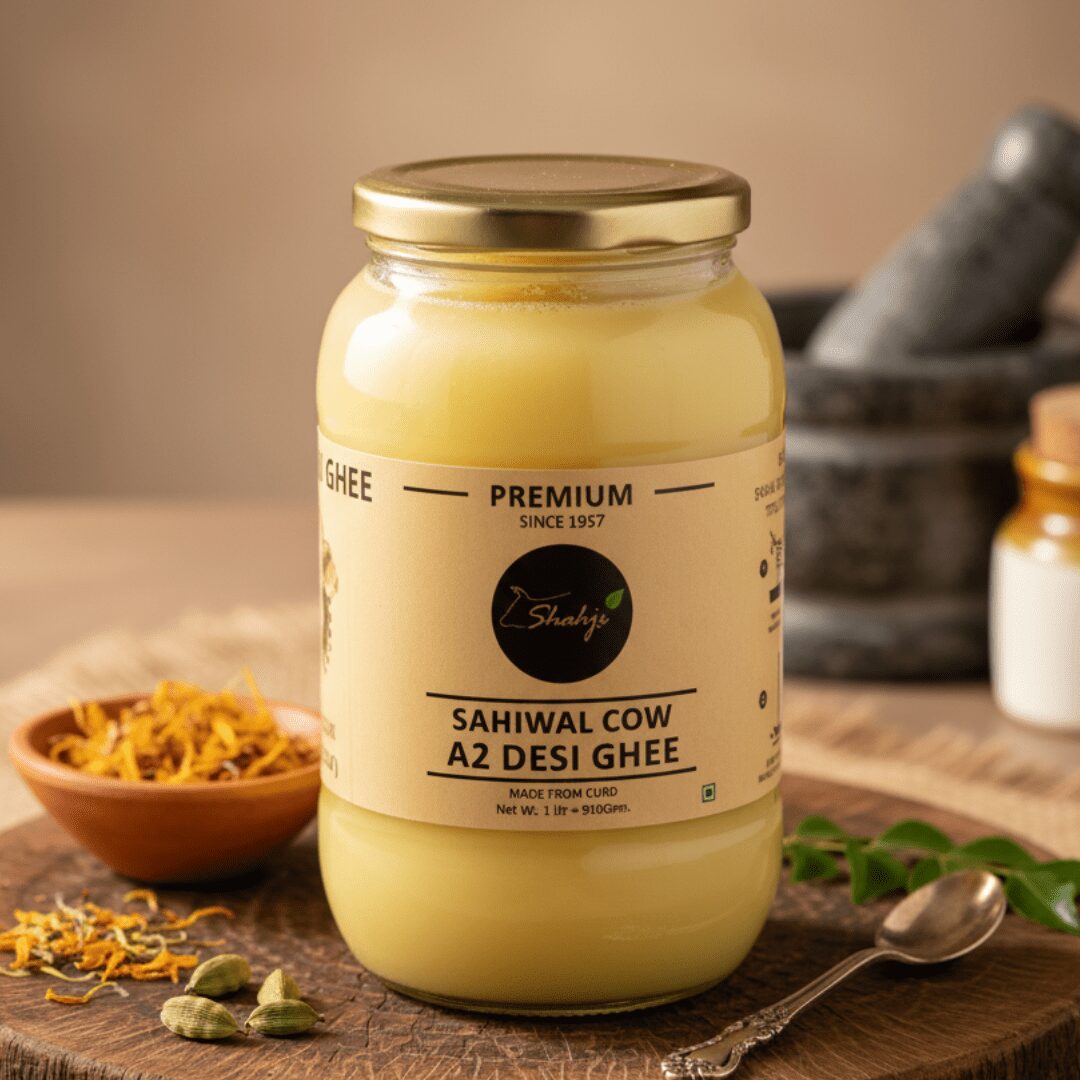Side Effects Of Ghee: Does Ghee always healthy? – Shahjighee

Ghee has always been a superfood, and there is no doubt about it. Ghee helps us in keeping our health at an excellent level. But it cannot be denied that what is always good for us is not always good for us.
If so, isn’t ghee also always good for us? If yes! So when is ghee not good for us, and what are the disadvantages of ghee if we consume it in excess? This is what we will examine in this article. So request you to stay till the end of this article.
What is ghee?

Ghee is a type of clarified butter that is commonly used in Indian cuisine. It is made by simmering butter until the milk solids and water have been removed, leaving behind a rich and flavorful liquid that is high in fat and can be used for cooking, baking, or as a spread.
Ghee has a nutty flavor and a high smoke point, making it suitable for high-heat cooking methods such as frying and sautéing. It is also considered a healthy fat as it contains healthy saturated fats and is easy to digest.
Does ghee always healthy?
Well it depends upon you and your consumption need. If you eat ghee in higher quantity it will harm your body in long run, so consume ghee maximum 1 – 3 spoon daily. So that it will benefits you.
Ghee, a type of clarified butter, is often considered healthy due to its high levels of beneficial fatty acids and lack of lactose and casein (proteins found in milk). It is also often used in Ayurvedic medicine as a health-promoting substance.
However, it is still a high-calorie, high-fat food and should be consumed in moderation as part of a balanced diet. Additionally, some individuals with a history of heart disease or high cholesterol may need to limit their intake of ghee. Consult with a healthcare professional before adding ghee to your diet.
Why should we take ghee in moderation?
Ghee, also known as clarified butter, is high in saturated fats. Consuming too much-saturated fat can lead to an increased risk of heart disease and high cholesterol levels.
Additionally, ghee is also high in calories, which can contribute to weight gain if consumed in excessive amounts. Therefore, it is important to consume ghee in moderation to maintain a healthy diet and prevent negative health effects.
When does ghee become unhealthy for us?
Ghee can become unhealthy for us if it is consumed in excessive amounts or if it is made from low-quality ingredients. Consuming too much ghee can lead to weight gain and an increase in cholesterol levels.
Additionally, ghee made from low-quality ingredients, such as milk from poorly treated cows, can contain harmful bacteria and contaminants. To reap the health benefits of ghee, consume it in moderation and choose high-quality, organic ghee.
15 Side Effects Of Ghee For Your Body
if you eat ghee in excess, then it may cause some side effects to your body. So, that means consume desi ghee in moderation (approx. 2-3 spoon/day)
- High-calorie content: Ghee is high in calories and fat, which can contribute to weight gain if consumed in excess.
- Risk of heart disease: Ghee is high in saturated fat, which can increase the risk of heart disease if consumed in large amounts.
- Lactose intolerance: Ghee is made from butter, which contains lactose. People with lactose intolerance may not be able to tolerate it.
- Risk of food allergies: Some people may be allergic to the milk proteins found in ghee.
- Risk of high cholesterol: Ghee is high in cholesterol, which can increase the risk of high cholesterol levels if consumed in large amounts.
- Risk of cancer: Some studies have suggested that a diet high in saturated fat may increase the risk of certain types of cancer.
- Risk of digestive problems: Consuming large amounts of fat can cause digestive issues such as diarrhea, bloating, and gas.
- Risk of high blood pressure: Ghee is high in sodium, which can contribute to high blood pressure if consumed in large amounts.
- Risk of osteoporosis: A diet high in saturated fat may negatively affect bone health and increase the risk of osteoporosis.
- Risk of type 2 diabetes: Some studies have suggested that a diet high in saturated fat may increase the risk of type 2 diabetes.
- Risk of liver problems: Consuming large amounts of fat can cause liver problems such as fatty liver disease.
- Risk of kidney problems: Consuming large amounts of fat can cause kidney problems like kidney stones.
- Risk of stroke: A diet high in saturated fat may increase the risk of stroke.
- Risk of acne: Ghee can aggravate skin conditions such as acne.
- Risk of obesity: Ghee is high in calories, which can contribute to obesity if consumed in excess.
Conclusion
In conclusion, ghee is a traditional and healthy cooking oil that has been used for centuries in many cultures. While it contains a high amount of saturated fat, studies have shown that when consumed in moderation, it can have a variety of health benefits.
It is important to note, however, that excessive ghee consumption can result in negative side effects such as weight gain, increased cholesterol levels, and heart disease.
It is always recommended to speak with a healthcare professional before making any dietary changes and to follow a balanced diet and lifestyle.
Also Read:
- Best Desi Ghee Your Should Buy
- What is Gir cow A2 ghee & its benefits?
- A1 Ghee Vs A2 Ghee ghee – which is better?
Frequently Asked Questions – FAQs
Does ghee have side effects?
Yes, ghee has many side effects. Though the CLA in ghee has been shown to help some people lose weight, it is also a high-calorie and fat-rich food. Despite its health benefits, consuming too much ghee can lead to weight gain and increase the risk of obesity.
Who should avoid ghee?
Doctors advise people with heart disease or kidney disease not to consume large amounts of cow ghee. If you have a stomach disorder, you should avoid eating cow ghee or any other type of ghee.
Does ghee cause fatty liver?
Ghee is not the cause of liver problems, but if you already have liver problems such as jaundice, fatty liver, or gastrointestinal pain, you should avoid ghee as it may cause serious organ problems. Consuming ghee in moderation, on the other hand, does not harm the liver.
Is ghee hard to digest?
Ghee contains medium-chain fatty acids, which are easier to digest and healthier for your heart than other saturated fats.
How much ghee per day is healthy?
Ghee consumption recommendations vary depending on age, gender, and activity level. A general rule of thumb is to consume 1-2 teaspoons (5-10 grams) of ghee per day.
Ghee is a high-calorie food that should be consumed in moderation as part of a well-balanced diet. It is always best to seek personalized advice from a healthcare professional or registered dietitian.
A2 Gir Cow Ghee
1 LTR
Best Price: ₹2125 with Coupons

A2 Gir Cow Ghee 2 Litre Combo Pack
Best Price: ₹4125 with Coupons
A2 Sahiwal Cow Ghee
1 LTR
Best Price: ₹1619 with Coupons














